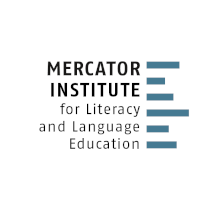Who we are
Our mission statement
Success in education depends to a large extent on language skills. Language requirements can often pose a serious obstacle, however, especially for children and young people from families of low educational or socioeconomic level or of migrant origin.
The Mercator Institute for Literacy and Language Education is committed to improving language education, by
- researching and developing innovative concepts, measures and tools for language education and for the professionalization of teachers and educators.
- providing regional training for prospective teachers and national training for educators in nurseries, schools and adult education.
- preparing academic findings specifically for decision-makers in educational policy, administration and practice, and making them available in a variety of formats.
- serving as a central Germany-wide point of academic contact for language education and engaging in the debate on how to improve education.
- working on an interdisciplinary level, in national and international networks, following a benefits-driven and practical approach.
Through its research and academic services it provides to language education in a multilingual society, the Mercator Institute helps create more equal opportunities in the education system.
Networks
The Mercator Institute is a member of the Leibniz Education Research Network Alliance (LERN). In this network, 25 research institutions have joined forces to combine their expertise and increase the profile of the Leibniz Association in educational matters among research funders, political decision-makers, educational administrators and the general public. Furthermore, the office that coordinates the federal and state-level initiative BiSS-Transfer, a joint initiative of the Federal Ministry of Education and Research and the Standing Conference of the Ministers of Education and Cultural Affairs of the Länder in the Federal Republic of Germany to transfer language education, reading and writing support in schools and nurseries. It is closely linked to its predecessor, the initiative Education through Language and Literacy (BiSS). The Mercator Institute for Literacy and Language Education, the DIPF | Leibniz Institute for Research and Information in Education and the Institute for Quality Development in Education (IQB) in cooperation with the Humboldt-Universität zu Berlin are in charge of the initiative’s supervision.
Organization
The Mercator Institute addresses questions of language education research in three departments: Language and Learning, Language and Education System and Language and Professional Development. Communications and Administration support the researchers in their work. In the Board of Trustees, decision-makers from the University of Cologne and Stiftung Mercator come together to discuss and resolve fundamental questions. The Academic Advisory Council advises the Mercator Institute on central scientific and strategic matters.
Language and Learning Department
The Language and Learning department primarily pursues research into language learning processes and the developmental trajectories of learners in educational institutions, focusing particularly on the situation of newly arrived migrant children. Members of the department conduct research in two areas. The first concentrates on the individual plurilingual skills and learning processes of educational participants. The second area involves researching language dynamics in teaching-learning processes, such as didactic and curricular models. The research results are incorporated into further training measures for teachers and educators as well as into transfer projects.
Language and Professional Development Department
The training and further education of teachers in the field of language education is the main focus of the Language and Professional Development department. This includes offers aimed at both students and teachers in professional practice. The department cooperates closely with the Cologne Government Regional Office. Research here focuses on the areas of professionalization and multilingualism.
Language and Education System Department
The Language and Education System department is concerned with processes in the education system that govern language education, and with the language-related processes involved in nursery school and school development. Through implementation, transfer and evaluation projects, the goal is to lay the foundations for contributing to the development of nursery schools and schools as educational institutions. In addition, the department prepares research knowledge and information on language education for educational administration and policy. The transfer is based on quality-assurance methods of finding and preparing evidence, and on cooperative activities between the groups of actors involved.
Communications
Science communication contributes to making knowledge about language education accessible to non-academic target groups and to facilitating objective debates about the successful design of education. The main fields of activity are media relations, transfer publications, online communication and events. Together with the researchers, Communications develops and implements effective communication strategies and measures. In addition, it provides advice during the planning and application phase.
Administration
Administration ensures that a suitable working environment with all the necessary equipment is made available for all team members. The department provides the administrative support that is required for all projects and teaching, handles matters relating to employment contracts, especially those involving cooperation with the central administrative department of the University of Cologne, and ensures compliance with occupational health and safety requirements. Administration is also responsible for handling financial and personnel information concerning the entire institute, as well as aspects relevant to the executive bodies.
